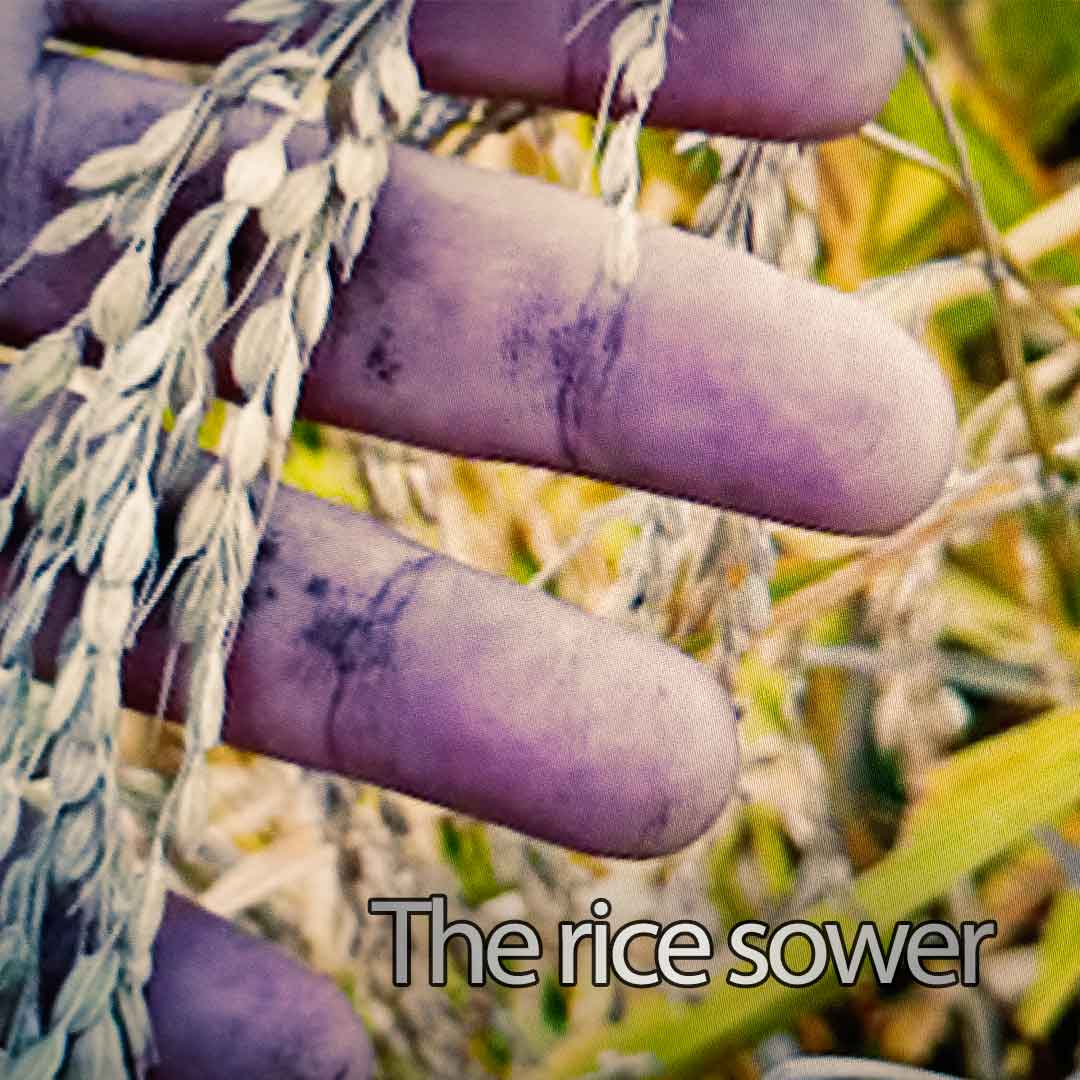The rice sower
El sembrador de arroz


A story about hardened hearts
A hardened heart can be likened to a man who had a paddy field. Rice was his favorite food, for he only knew rice. One day, a foreigner, another farmer, passing by, approaches the rice sower and starts a conversation. The rice sower proudly talks about his rice fields and the foreigner, in return, tells the rice sower about his tomato and apple crops, all unknown fruits to the rice sower. But the rice sower is skeptical about what the foreigner tells him and decides not to believe in the existence of something other than rice.
Time went by and a second foreigner—another farmer—passing by the lands of the rice sower, approaches him and starts a conversation. Once more, the rice sower proudly talks about his rice fields and the foreigner, in return, tells the rice sower about his tomato, apple, pear, and mango crops, all unknown fruits to the rice sower. This time, however, as a way to motivate the rice sower to plant something different, the second foreigner hands the rice sower various seeds, so that he may experience what it means to eat something other than rice. But sadly, once more skeptical, the rice sower, although accepting the seeds, never opens a space in his paddy field to plant them and the seeds eventually die.
Time went by and a third foreigner—another farmer—passing by the lands of the rice sower, approaches him and starts a conversation. The rice sower, as usual, proudly talks about his rice fields. The foreigner, in return, after listening to the rice sower, tells him about his crops and the innumerable fruits he grows, offering to give to the rice sower several seeds, so that he may plant something different. Moreover, the foreigner tells him about what he does by mixing the different fruits that he grows, preparing, this way, tasty and delicious meals. Despite this, the rice sower, blinded by skepticism, clings even more to rice and refuses to accept the seeds that the foreigner offers him.
Time went by and, one day, without expecting it, the rice sower dies of malnutrition, for his body was in need of many things different from rice.
Time went by and a second foreigner—another farmer—passing by the lands of the rice sower, approaches him and starts a conversation. Once more, the rice sower proudly talks about his rice fields and the foreigner, in return, tells the rice sower about his tomato, apple, pear, and mango crops, all unknown fruits to the rice sower. This time, however, as a way to motivate the rice sower to plant something different, the second foreigner hands the rice sower various seeds, so that he may experience what it means to eat something other than rice. But sadly, once more skeptical, the rice sower, although accepting the seeds, never opens a space in his paddy field to plant them and the seeds eventually die.
Time went by and a third foreigner—another farmer—passing by the lands of the rice sower, approaches him and starts a conversation. The rice sower, as usual, proudly talks about his rice fields. The foreigner, in return, after listening to the rice sower, tells him about his crops and the innumerable fruits he grows, offering to give to the rice sower several seeds, so that he may plant something different. Moreover, the foreigner tells him about what he does by mixing the different fruits that he grows, preparing, this way, tasty and delicious meals. Despite this, the rice sower, blinded by skepticism, clings even more to rice and refuses to accept the seeds that the foreigner offers him.
Time went by and, one day, without expecting it, the rice sower dies of malnutrition, for his body was in need of many things different from rice.
Una historia sobre los corazones endurecidos
La dureza del corazón se parece a un hombre que tenía un campo de arroz. El arroz era su comida favorita, pues solo conocía el arroz. Un buen día, un forastero, otro agricultor, pasando por sus tierras, se acerca al sembrador de arroz y estos comienzan a hablar. El sembrador de arroz, orgulloso, le habla sobre su cultivo de arroz mientras que el forastero le cuenta sobre sus cultivos de tomate y manzanas, frutos desconocidos por el sembrador de arroz. El sembrador de arroz se muestra incrédulo ante lo que le dice el forastero y decide no creer en la existencia de algo distinto al arroz.
Pasado el tiempo, un segundo forastero —otro agricultor—, pasando por las tierras del sembrador de arroz, se acerca y comienzan a hablar. De nuevo el sembrador de arroz, orgulloso, habla sobre su cultivo de arroz, y el forastero, a su vez, sobre sus cultivos de tomates y manzanas, peras y mango, frutos desconocidos por el sembrador de arroz. Como forma de motivarle a sembrar algo distinto al arroz, el segundo forastero le regala semillas al sembrador de arroz para que experimente lo que es comer otra cosa. Sin embargo, mostrándose nuevamente incrédulo, el sembrador de arroz, a pesar de aceptar las semillas, nunca abre espacio en su campo de arroz para sembrarlas y estas mueren con el tiempo.
Pasado el tiempo, un tercer forastero —otro agricultor— pasa por las tierras del sembrador de arroz y se acerca a conversar con él. El sembrador, como de costumbre, habla orgullosamente sobre su campo de arroz. El forastero, por su parte, después de escuchar al sembrador, le habla sobre sus cultivos de innumerables frutos y le proporciona diversas semillas para que siembre algo distinto. Asimismo, le cuenta sobre todo lo que hace mezclando sus frutos y las preparaciones que consigue muy agradables al paladar. El sembrador de arroz, sin embargo, enceguecido por su incredulidad, se aferra más al arroz y no acepta las semillas que le ofrece el forastero.
Y así, pasado el tiempo, un buen día y sin esperarlo, el sembrador de arroz muere por desnutrición, pues su cuerpo necesitaba de muchas cosas más distintas al arroz.
Pasado el tiempo, un segundo forastero —otro agricultor—, pasando por las tierras del sembrador de arroz, se acerca y comienzan a hablar. De nuevo el sembrador de arroz, orgulloso, habla sobre su cultivo de arroz, y el forastero, a su vez, sobre sus cultivos de tomates y manzanas, peras y mango, frutos desconocidos por el sembrador de arroz. Como forma de motivarle a sembrar algo distinto al arroz, el segundo forastero le regala semillas al sembrador de arroz para que experimente lo que es comer otra cosa. Sin embargo, mostrándose nuevamente incrédulo, el sembrador de arroz, a pesar de aceptar las semillas, nunca abre espacio en su campo de arroz para sembrarlas y estas mueren con el tiempo.
Pasado el tiempo, un tercer forastero —otro agricultor— pasa por las tierras del sembrador de arroz y se acerca a conversar con él. El sembrador, como de costumbre, habla orgullosamente sobre su campo de arroz. El forastero, por su parte, después de escuchar al sembrador, le habla sobre sus cultivos de innumerables frutos y le proporciona diversas semillas para que siembre algo distinto. Asimismo, le cuenta sobre todo lo que hace mezclando sus frutos y las preparaciones que consigue muy agradables al paladar. El sembrador de arroz, sin embargo, enceguecido por su incredulidad, se aferra más al arroz y no acepta las semillas que le ofrece el forastero.
Y así, pasado el tiempo, un buen día y sin esperarlo, el sembrador de arroz muere por desnutrición, pues su cuerpo necesitaba de muchas cosas más distintas al arroz.
Explanation
The rice sower represents a person who is hardened by sin. The foreigners are those individuals who, in various ways, make a call to conversion. Rice is an image of sin itself, while the soul is the field on which sin is imprinted. Sin takes roots in the soul, hardens the heart, and blinds the person who commits it. The seeds that are offered to the rice sower represent graces, lights that point in the direction of Jesus. Nevertheless, the seeds must be planted in good soil—a symbol of opening a space in the field—in order for them to grow and bear fruit. But the rice sower’s skeptical attitude, that is, not wanting to dispose himself to God’s grace, prevents grace from doing its job in the soul. The third foreigner, with his detailed descriptions of all the fruits that he grows, can be likened to a person who tells others about the wonders God has done in his life which, when heard by someone hardened by sin, makes the person to become even blinder due to the intense light he perceives. With no desire to change, the rice sower is left in even greater darkness. Finally, death by malnutrition is an image of the soul’s death, i.e., eternal damnation, because constancy in sin robs the soul of all inspiration, light, grace required to return to Jesus—Life itself—, something that, at the moment of physical death, can lead a person to refuse to recognize his sins, to refuse to humble himself before Jesus no matter the consequences, and thus choose to remain eternally separated from God. The fact that all characters in the story are farmers means that we all share the same experience of being alive in order to choose freely whether or not we want to love God.
Explicación
El sembrador de arroz es aquella persona que está endurecida por el pecado. Los forasteros son aquellas personas que intentan de diversos modos hacer un llamado a la conversión. El arroz es el pecado como tal, mientras que el alma es el campo donde este se siembra. El pecado echa raíces en el alma, endurece el corazón, y enceguece a la persona que lo comete. Las semillas que le ofrecen los forasteros al sembrador son gracias, luces que muestran el camino de vuelta a Jesús. Sin embargo, las semillas deben plantarse en buen terreno —símbolo del abrir espacio en el campo— para que estas puedan crecer y dar frutos. Pero la incredulidad del sembrador de arroz, es decir, el no querer disponerse a la gracia de Dios, impide que las gracias hagan su trabajo en el alma. El tercer forastero, con sus descripciones minuciosas de la diversidad de frutos que cosecha, se parece a aquella persona que relata todas las maravillas que Dios ha hecho en su vida y que, al ser escuchadas por un alma endurecida por el pecado, hacen que esta se enceguezca más por la intensa luz que percibe. Sin existir una disposición —así sea pequeña— de querer cambiar, el sembrador de arroz queda todavía más en tinieblas. Finalmente, la muerte del sembrador por desnutrición simboliza la muerte del alma, es decir, la condenación eterna, pues la constante insistencia en el pecado roba toda inspiración, luz, gracia necesaria para volver a Jesús —la Vida misma—, algo que en el momento de la muerte física puede conducir a la persona a no querer reconocer sus pecados, a no querer humillarse ante Jesús por ningún motivo, y así decidir permanecer eternamente apartada de Dios. El que los personajes sean todos agricultores significa que todos compartimos la misma experiencia de vivir para decidir libremente si queremos o no amar a Dios.
About / Acerca de
Raúl Hurtado
English
Raúl Hurtado is a singer-songwriter and author who likes to write about life, spirituality, and tools that help us lead more happy and balanced lives. Connect with Raúl on social media and keep the conversation going.
Español
Raúl Hurtado es un cantautor y escritor que escribe sobre temas relacionados con la vida, la espiritualidad, y herramientas que nos ayudan a llevar vidas más felices y equilibradas. Conéctate con Raúl en medios sociales y sigue la conversación.
